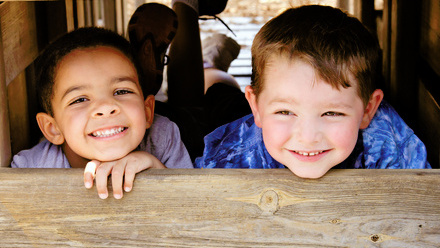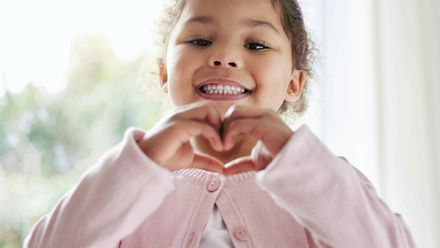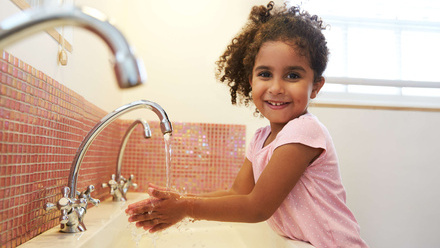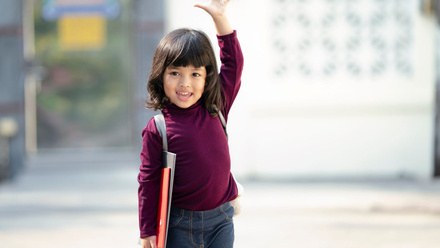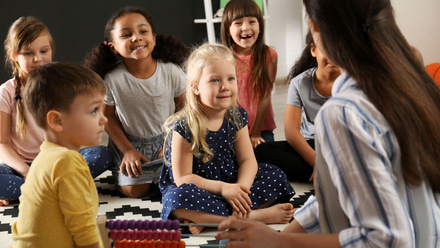The power of connection: supporting co-regulation with young children
Self-regulation skills form a big part of a young child’s personal, social and emotional development, underpinning their responses internally and the ways in which they relate to others. Self-regulation, whilst an internal mechanism, is something that requires external support from trusted adults who provide safety and assurance when emotions get overwhelming and difficult to handle.
Co-regulation involves the support of caring adults to foster the development of self-regulation together, co-constructing how it grows throughout childhood and into adult life. Because of this, the role and form of co-regulation changes as the child grows but, nonetheless, remains an asset and reassurance for children negotiating new experiences and unfamiliar emotional responses to them.
We’ve looked at what self-regulation is and how it relates to early education and care practice, but what comes before that? Let’s take a look at co-regulation and how to implement effective practices with the children in our care.
What is co-regulation?
Emotions are infectious. When a baby laughs, we start to laugh too. Young children are the experts at mirroring emotions and reactions: fascinated by our responses, they look to our reactions to learn a huge amount about the emotional world around them.
Co-regulation refers to the collaboration between a trusted adult and a child who share a meaningful bond in a moment that supports the development of self-regulation skills by co-constructing emotional responses together. Being able to tune into the needs of the child in that specific moment and respond in a way that supports them to regulate their emotions allows children to begin to build their own strategies to navigate unavoidable challenges in the future.
For very young children, the capacity to manage emotions and respond in a measured way is extremely limited, which is why we often associate co-regulation with babies who are most dependent on adults to support their emotional needs. But, as we respond sensitively to these needs and build a trusting relationship to meet these needs, we are establishing the foundations for self-regulation to ground itself in.
It’s not just babies who need co-regulation! As children grow, their needs and the situations they find themselves navigating become more complex, with a broader spectrum of emotions emerging too. We are all constantly learning, which is why sometimes we all, even as adults, need a little bit of support to calm down, rationalise or evaluate our emotional reactions. As early education and care professionals, it’s important that we pay attention to the emotional needs and support children’s co-regulation throughout early childhood and not just their first year.
How can we support co-regulation?
Consistency is key
Maintain consistent routines and rules to provide a sense of security, allowing children to explore in a predictable space, reducing stress and distractions. Of course, there are times where consistency isn’t possible and navigating these unexpected situations should be done in a way that respects the child’s autonomy and provides comprehensible reasons for actions to help them to manage the situation, especially if it is something that will cause upset, such as a change to plans that they were looking forward to.
It is important for a child to receive this consistency across every area of their life, such as in the home learning environment as well as within setting. Effective communication that highlights the importance of co-regulation and brings awareness to its essentiality in all environments creates a productive space in which to collaborate with parents and carers, working towards consistent approaches to coregulation with all trusted adults.
Model regulation strategies to support knowledge
Children learn about their emotions by observing and mirroring others. Demonstrate how to handle emotions calmly in your own behaviours, highlighting how you respond to similar situations, voicing your own thought-processes to demonstrate methods for self-regulating and coping with overwhelming situations.
In doing so, involve children in the process, asking them what they might do and encourage the child to express their emotions and needs in appropriate ways with you, such as by utilising sensory toys, moving to a calm space together or having a break with a glass of water.
Tune into the child's individual needs
Every child is unique, responding to different stimuli and reacting in different ways. Knowing the specific needs of each child as they grow and learn is important in every respect, but especially so when thinking about internal thought processes and emotional responses. Pay attention to signs of distress, fatigue or overstimulation as common signs of dysregulation, but remain open to considering how all behaviours might indicate emotional changes in children as independent people with autonomy and feelings of their own. Respond promptly and appropriately to the child's emotional needs, seeking to validate their feelings by acknowledging them, helping children to identify and label emotions, reassuring children that they are in control when feelings get a bit overwhelming and potentially scary.
Teach problem-solving skills
When things get overwhelming, it can be challenging to navigate choices, where the simplest decisions can seem like life-changing offers. Support these experiences by offering limited choices to empower the child in making decisions.
Work through problems with children by helping them to communicate their needs and think through simple problems, offering guidance but allowing them to take the lead on how the act. It’s also important to recognise and value the efforts children have made. Overcoming barriers and working through unfamiliar feelings can be tricky! Praise the child's efforts to manage their emotions or solve problems, reinforcing this as positive behaviour to be maintained.
Summing up
Coregulation is key to sustaining self-regulation throughout life.
The impact of effective social emotional learning is a broad aspect with an ever-wider influence upon our educational outcomes and attitudes. Self-regulation strategies are promoted throughout a child’s entire educational journey, but it’s important to trace back the roots to where this all begins, to manage and sustain effective emotional management with maximum impact. Just as we wouldn’t expect a child to intuitively know their letters and sounds, we shouldn’t expect them to have the tools to respond to the ever-changing spectrum of emotions they experience daily. Co-regulation gives children the power to gain autonomy in their emotional experiences and responses too. It provides the first stepping stone into a healthy emotional journey throughout childhood and adult life.

